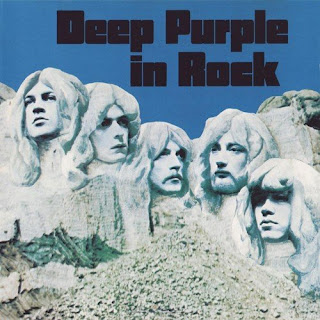 |
| Deep Purple circa 1983 |
Deep Purple Select Discography:
• Shades of Deep Purple (Tetragrammaton Records, 1968)
• The Book of Taliesyn (Tetragrammaton Records, 1968)
• Deep Purple (Tetragrammaton Records, 1969)
• Concerto for Group and Orchestra [live] (Tetragrammaton Records, 1969)
• Deep Purple In Rock (Warner Bros, 1970)
• Fireball (Warner Bros, 1971)
• Machine Head (Warner Bros, 1972)
• Made In Japan [live] (Warner Bros, 1972)
• Who Do We Think We Are (Warner Bros, 1973)
• Burn (Warner Bros, 1974)
• Stormbringer (Warner Bros, 1974)
• Come Taste the Band (Warner Bros, 1975)
• Made In Europe [live] (Warner Bros, 1976)
• Deep Purple In Concert [live] (Spitfire Records, 1980)
• Live In London [live] (Harvest Records, 1982)
• Perfect Strangers (Polydor Records, 1984)
• The House of Blue Light (Polydor Records, 1987)
• Nobody's Perfect [live] (Polydor Records, 1988)
• Slaves and Masters (RCA Records, 1990)
• The Battle Rages On... (Giant Records/BMG, 1993)
• Purpendicular (CMC International/BMG, 1996)
• Abandon (CMC International/BMG, 1998)
• Bananas (Sanctuary Records,2003)
• Rapture of the Deep (Eagle Records, 2005)
• BBC Sessions 1968–1970 (EMI Records, 2011)
• Now What?! (Eagle Records, 2013)
• Infinite (earMUSIC, 2017)
Deep Purple Mini-Bio
British rockers Deep Purple are inarguably one of the most influential bands of all time. Purple's trail-blazing mix of operatic vocals, virtuoso guitar and keyboards, and unrelenting rhythms informed several generations of rock superstars, from Kiss, Queen, and Van Halen in the 1970s to Metallica and Iron Maiden in the '80s and even bands like Pantera and Alice In Chains in the '90s. Purple's imprint on the evolution of hard rock and heavy metal is enduring and undeniable.
Formed in 1968 by singer Rod Evans, guitarist Ritchie Blackmore, bassist Nick Simper, keyboardist Jon Lord, and drummer Ian Paice, Deep Purple were originally a psych-influenced progressive rock band. This line-up recorded three late '60s albums that were released by the indie Tetragrammaton Records and scored hits with cover songs like Joe South's "Hush," Neil Diamond's "Kentucky Rain," and Donovan's "Lalena." By 1970, however, as rock music was evolving, so was Deep Purple, towards a heavier, harder-rocking sound.
Evans and Simper, deemed "unsuitable" for the band's new direction, were ousted, replaced by singer Ian Gillan and bassist Roger Glover, who were also a songwriting team. This cemented the legendary "Mark II" line-up of the band that lasted from 1969 to 1973, re-forming again for a five-year run from 1984 to 1989. First finding success in the U.K. with albums like Deep Purple In Rock and Fireball, the band scored a multi-Platinum™ Top 10 U.S. hit in Machine Head, which yielded their classic song "Smoke On the Water." The band's Made In Japan live set went Platinum™ in the U.S. and sold over eight million copies worldwide. Purple's 1973 studio follow-up, Who Do We Think We Are, earned a Gold™ record for sales but tensions between the band members came to a head with Gillan quitting the band and Blackmore subsequently firing Glover.
Purple soldiered on, recruiting singer David Coverdale (later of Whitesnake) and bassist/vocalist Glenn Hughes (Trapeze) for the recording of Burn, the band's eighth studio album, which became a Top 10 hit that was followed quickly by Stormbringer, both albums scoring Gold™ Record status. Disgruntled over the musical direction of the band, Blackmore quit to form Rainbow with singer Ronnie James Dio. Undaunted, Purple brought in guitarist Tommy Bolin for the disappointing Come Taste the Band, but after Bolin's death in 1976, Lord and Paice decided to break up the band.
After being offered a truckload of cash, the Mark II version of Deep Purple reunited in 1984 for a pair of studio LPs and a live album, but the bad blood between Gillan and Blackmore proved too much, the singer left the band once again. Purple brought in former Rainbow vocalist Joe Lynn Turner for the horribly mediocre Slaves and Masters album, but when the rest of the band wanted to bring Gillan back in the fold for the band's 25th anniversary, Blackmore acquiesced, but left the band himself after the release of The Battle Rages On, quitting during the album's support tour and temporarily replaced by shredder Joe Satriani. Accomplished six-string virtuoso Steve Morse (Dixie Dregs) took his place, and other than Jon Lord retiring in 2002 (R.I.P. 2012), to be replaced by journeyman keyboardist Don Airey (another Rainbow veteran), this Purple line-up has continued to tour and record to this day.
This is but a brief overview of Deep Purple's lengthy and complex 50-year career. If you want the full story, check out writer Martin Popoff's comprehensive history of the band. There are a bunch of dodgy Deep Purple live albums, some of 'em pretty good, but most of them not so much, and I haven't listed those here. There are also a slew of various compilation albums that I'd avoid, but if you really need to check out the band, look no further than Machine Head and/or Perfect Strangers. If you dig those LPs, the rest of these will end up in your collection sooner or later...



1 comment:
Thanks for this, Rev!
Post a Comment